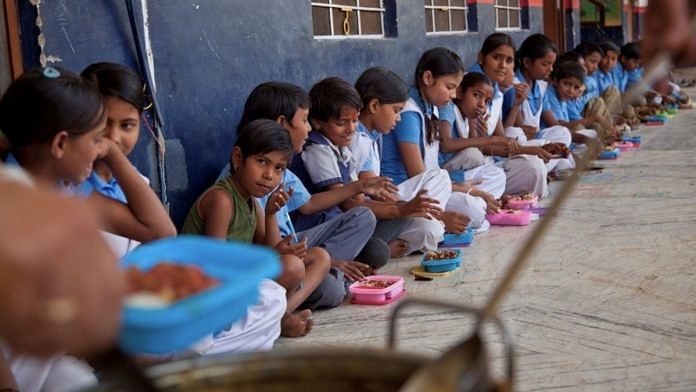Can boycotts be an effective strategy to fight against untouchability in India? This is a question that emerged after Scheduled Caste students in Uttarakhand’s Champawat district refused to eat mid-day meals cooked by Pushpa Bhatt, a Brahmin woman. The students were protesting the removal of the previous cook, Sunita Devi, a Dalit. The dominant-caste students had initially refused to eat food cooked by Devi, so the district education officer dismissed her and appointed Bhatt. To counter this, the SC students also followed the same strategy.
The practice of untouchability has been abolished under Article 17 of the Indian Constitution. It has also been made a punishable offence under Sections 4 and 7 of the Protection of Civil Rights Act, 1955. So, the victims of untouchability have legal remedies, but instead of solely relying on them, they counter-boycotted in Uttarakhand – a social strategy to fight injustice immediately.
Limitation of legal remedies
Although the Constitution abolished the practice and Parliament enacted laws to punish the practitioners of this social evil, the bitter truth is that untouchability is still alive. The Uttarakhand incident is not an isolated example, just watch the news. Survey-based reports also confirm that untouchability is widespread in Indian society, which means that legal remedies are not working effectively. The question is, why? The answer lies in the nature and character of untouchability.
Untouchability is practised both in the public and private spheres. It is relatively easy for the government and its agencies to fight against this evil in public institutions such as schools, government offices and hospitals. But it is a herculean task to fight against it in families and society. This is because the coercive and administrative apparatus of the Indian State – police, judiciary, civil servants – avoid entering such spaces since they are protected from unreasonable State intervention. The autonomy of family and society has allowed untouchability to live, and sometimes, it tries to enter public institutions also.
Also read: ‘Caste didn’t lead to sacking’ — Uttarakhand Dalit midday meal cook likely to get job back
Boycott as a counter-strategy
In Uttarakhand’s case, remember it is the parents of dominant-caste students who first opposed Sunita Devi cooking food. The students learned the practice of untouchability from their family, and then imposed it in the government school. Hence, the effective way of fighting untouchability would be to nab it in the spheres of family and society. And that would only be possible when like-minded people start pointing out petty and casteist systems in our family and society that enable untouchability.
Take, for example, the practice of keeping separate utensils for Scheduled Castes in homes, not allowing domestic workers to enter the kitchen and worship room, and refusing to eat at the house of Dalits during public functions such as marriages and birthday parties. These are situations where State agencies such as police and administration cannot be called in because it puts an unnecessary burden on the victim to provide evidence. Furthermore, such action also generates animosity among friends and family. Therefore, in such situations, the most naïve solutions work best – refusing to eat at somebody’s home who offers food in separate utensils.
A tested strategy
Although the counter boycott strategy to fight untouchability has gained the spotlight with the Uttarakhand incident, it has been used in Dalit movements earlier as well. I have come across several stories from Uttar Pradesh, particularly Awadh and Purvanchal regions, where Scheduled Castes refused to eat in social gatherings of dominant castes and OBCs in the mid-1990s to protest unequal and non-reciprocal treatment during dining.
Such boycotts took some time to produce outcomes but resulted in disrupting the practice of untouchability locally. The same is the case in family spheres. After the Uttarakhand incident, several individuals told me that they have also refused to eat at the houses of their friends and neighbours who previously refused to eat at their house. These non-violent ongoing counter-responses can change the behaviour of dominant castes.
Also read: Dalit cook Sunita Devi resisted in Uttarakhand. And became a potential Rosa Parks for India
How counter-boycott works
The counter-boycott by Scheduled Castes works in changing the attitude of practitioners of untouchability because it gives them the opportunity to introspect their social attitude and personal behaviour. Right and wrong in society are often based on societal consensus, which keeps evolving. People fail to understand what is wrong in their judgement because they are not objected to. But when told, more often than not, they rectify their errors. The practitioners of untouchability often think that they have not done anything wrong, but telling them forces them to introspect at least.
According to philosopher Immanuel Kant, human beings have an inherent tendency to create rules that can be universalised. So, when one is boycotted, it forces them to think that there exists a potential threat of similar treatment if they do not change their behaviour.
Arvind Kumar (@arvind_kumar__) is a PhD Scholar, Department of Politics & IRs, Royal Holloway, University of London. Views are personal.
(Edited by Neera Majumdar)



